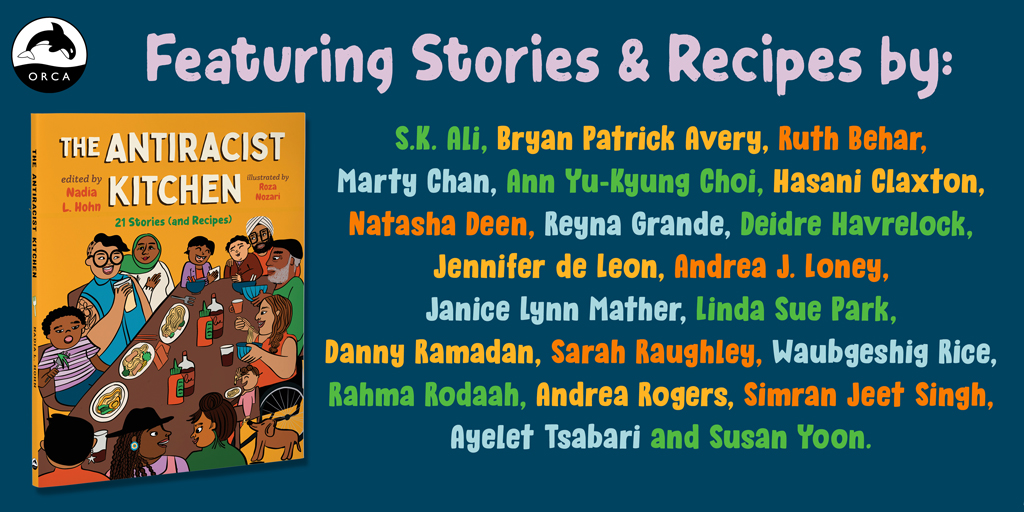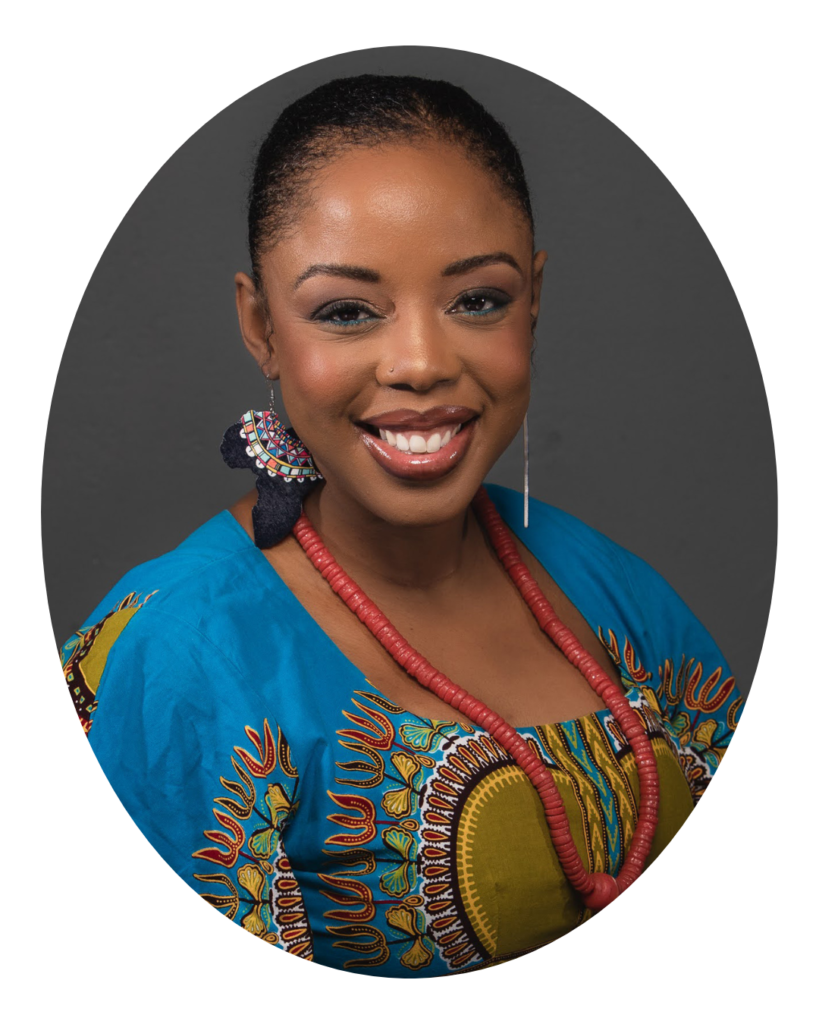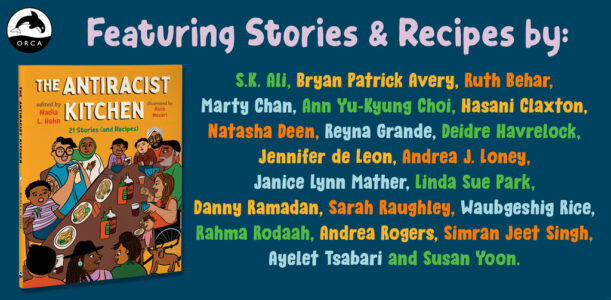
“Some of these stories will make you laugh, and some will make you cry. But all of them will bring you together in the kitchen.”
—Sadé Smith, author of Granny’s Kitchen
What if talking about racism was as easy as baking a cake, frying plantains or cooking rice?
Publishing September 12, 2023, The Antiracist Kitchen is a celebration of food, family, activism and resistance in the face of racism. In this anthology featuring stories and recipes from 21 award-winning North American Black, Indigenous and People of Colour (BIPOC) authors and illustrators for young people who share the role of food in their lives and how it has helped fight discrimination, reclaim traditions and celebrate diverse histories and cultures.
In this Q&A, learn all about the editor Nadia L. Hohn’s inspiration behind this book and why it is so timely for young readers today.
What inspired you to create this unique collection of recipes and stories?
I have always had a love of food. In 2010 I began a blog documenting my journeys with thyroid cancer and becoming a vegan, then vegetarian. My blog was filled with food photos and reviews of plant-based recipes, restaurants and cookbooks. The public response was amazing, and I thought of someday writing a cookbook.
Then in 2019 I noticed the growing list of Canadian BIPOC children’s literature creators (authors and illustrators) being published, and I felt the need to highlight their work in a book. I also saw a number of diverse middle-grade and young adult anthologies being published in the United States, but a lack here in Canada. I was inspired by my American peers, who headed such initiatives as We Need Diverse Books and Kweli: Color of Children’s Literature Conference. As a Black Canadian author, I longed for opportunities to dialogue with these literary peers. I have had a few experiences as an editor of written work and curator of films for festivals, so I felt confident in pulling a collection of stories together.
I have a long held passion for equity, diversity and inclusion work. My first master’s degree is in equity and sociology in education from the Ontario Institute for Studies in Education at the University of Toronto (OISE/UT). As the events of 2020 unfolded, post–George Floyd, I observed that some institutions were ill-equipped or doing performative, reactive and minimal actions when it came to antiracist work. I’ve observed or experienced the regurgitating or misuse of language, forwarding canned messages with limited processing on social media, while mistreating or not involving BIPOC people in the process. Many institutions/organizations were scrambling to enlist BIPOC employees and clients. I became very concerned that this was performative, reactive and couldn’t produce the long-lasting deep change that was required to address racism and systemic inequality.
As a teacher I also saw the need for racial literacy within the classroom and among my colleagues. I have experienced being the only staff member or one of a few staff members of color, and I was often tasked with being the “equity officer” or “equity committee”for a school. I was inspired to provide a tool for initiating courageous conversations about anti-racism that engage young people.
I also love to read meaningful anthologies, like Black Enough and Black Writers Matter, and short-story collections, like The Thing Around Your Neck, Summer Lightning and Other Stories and How to Love a Jamaican. I like how these stories briefly drop you into different lives and usually leave you wanting to read more about each character.
Finally, I was inspired by young BIPOC readers who need tools and strategies to cope with the racism they encounter, in the past and future, in their lives. Growing up as a Black girl, I would have loved a book that helped me to know that I wasn’t alone in my own experiences. I am inspired by safe spaces to share stories and the food which nourishes, represents cultures and histories, and brings people together.
I eventually came up with a book proposal which I pitched to Orca Book Publishers.
How did you find all the amazing contributors included in The Antiracist Kitchen?
Even though I began taking writing courses and workshops in the mid-2000s, I became very serious about my writing career in 2011, when I was working on my blog and going through my thyroid cancer treatment. After this I began to attend literary conferences and retreats and took writing courses in both the United States and Canada, including Kweli and the Highlights Foundation’s Amplify Black Stories cohort. During my recent Master of Fine Arts (MFA) program in Creative Writing, I had the chance to connect with a few diverse Canadian authors. I also hold membership with the Society for Children’s Book Writers and Illustrators (SCBWI) and other associations. These spaces provided me with many opportunities to meet kidlit creators from all over. I also widely read children’s and young adult literature and follow many BIPOC creators on social media. I wanted this book to be representative of the many groups that experience racial discrimination in different ways. If I didn’t know about a writer from a particular racial group or got turned down by someone I contacted, I would ask them if they could recommend another creator.
Can you talk a bit about the role of food in your life?
Food is something I enjoy and love to talk about. Food reflects a way to nourish and care for my body. As a vegetarian, food represents the values I hold dear. Food also reflects the creativity, resourcefulness, history, traditions and struggles of my ancestors and our global community. Food is an expression of love as it helps to keep us alive. I love to cook and prepare food for others; it’s a way to show I care. I love to photograph the foods I cook, so food is also my art. I’m always trying out new recipes.
Which recipe are you most excited to try from the book?
I am excited about so many things in this book! I’m a vegetarian with a sweet tooth, so I can’t wait to try the desserts. I am also craving dishes with fried dough. I also like that there are things that anyone can try in this book, with modifications. The recipes containing meat can also be adapted.
This book features bright, colorful illustrations by Roza Nozary. Do you have a favorite illustration?
I love the images where people are sitting in groups to eat—at a table or on a picnic blanket. These images reflect such a basic and universal experience: eating together, sharing food, conversing about our experiences and nourishing our bodies. All of this and the fact that Roza’s illustrations are so bright, beautiful and inclusive, means that the book is a literal feast for the eyes.
What was the most rewarding and/or challenging thing about writing this book?
The most rewarding thing was the fact that so many authors trusted me with their personal stories and that they shared them in the pages of my book. I feel truly honored to be a steward of these stories and will do my best to celebrate, protect, hold and make space for them, each one written with truth and authenticity. It’s also been rewarding to see the outpouring of support for this book from the many comments that I have received before its release. It is rewarding to know that this book came at just the right time.
The most challenging thing about writing The Antiracist Kitchen was the wait…I wanted this book to come out yesterday. Many events took place between 2020–2023, during the making of this book—a global fight against anti-Black racism and violence, the discovery of the graves of thousands of Indigenous children at former Canadian residential schools, the increased incidents of anti-Asian hate, Islamophobia and antisemitism. I kept thinking, we need this book right now.
What do you hope readers will take away from the book?
I want BIPOC readers to feel that they are not alone, their experiences and feelings are real, and there is not one correct way to respond to racism and racial injustice. I want young Black and brown readers to know that they have agency. They can march or create, fight or cook, speak up or rest, organize or come together with community, read or spend time alone. They can also choose to do all of the above. I also want my BIPOC readers to know that they are beautiful, I respect their cultures and traditions, and that their foods are not weird.
I want the readers who are not BIPOC—everyone else—to listen, read, learn, choose better actions, and become better allies. There is so much they can do to end racism and make this a better world.
What is an ingredient you can’t live without?
Hmmm…that’s really tough. One ingredient? How about a combination? I love chocolate and nuts and caramel altogether—in fudge, ice cream, cake and bars. I also like to make sure my food is spicy, too.

Nadia L. Hohn is a multilingual, world-travelling, award-winning author of several books for young people, including the Malaika series and A Likkle Miss Lou: How Jamaican Poet Louise Bennett Coverley Found Her Voice. She is an “artivist” who wants to make sure that all young people can see themselves in books. Nadia teaches kids and adults in Toronto. When she is not writing or cooking, Nadia is most likely reading, enjoying music, watching plays or daydreaming about her next adventure.
Photo by Lawrence Kerr.

